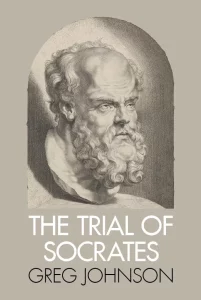Notes on Plato’s Gorgias, Part 9
1,871 words
Part 9 of 14 (Part 1 here, Part 2 here, Part 3 here, Part 4 here, Part 5 here, Part 6 here, Part 7 here, Part 8 here)
There is a deeper problem with Plato’s account of justice in the Gorgias. He treats it as an art (techne). But is justice really an art like medicine? In such dialogues as the Laches, Charmides, and Euthydemus, Plato explores the problems of treating moral wisdom as a techne. This is the error of the sophists.
In the Gorgias, however, Socrates does not challenge the idea that moral knowledge is a form of techne. Instead, he assumes that techne is the ultimate horizon. Within that horizon, he is fighting to establish philosophy, not sophistry, as the master art. Thus we should be watchful, for the whole argument of the Gorgias is premised on an idea treated as problematic elsewhere in Plato.
How does moral wisdom — virtues such as courage, temperance, and justice — resemble techne, and how does it differ? The main resemblance is that both moral wisdom and techne are practical. They are all related to action. They change the world. Even what we think of as theoretical technai, like arithmetic and geometry, arise from practical problems and are applied back to them. So it is natural to model moral wisdom on techne.
Remember also that alongside the technai there are non-technical knacks that also relate to action and production. They differ from technai insofar as they lack logoi, but they resemble them insofar as they are all practical.
But the analogy between technai and knacks on the one hand and moral wisdom on the other soon breaks down when we get more specific.
Such practical arts as shipbuilding, horse-training, and medicine all deal with delimited subject matters. Shipbuilders build ships. But they don’t build houses; that is the job of housebuilders. Horse-trainers train horses. But they don’t train dogs or children. Medicine heals sickness. But it doesn’t produce health. That is the job of the dietician and the physical trainer. We can also say that the various knacks have delimited subject matters. Cooking, for instance, existed as a knack long before it became a techne.
So if courage is an art, what is its delimited subject matter? What does it produce? The same questions can be asked about all virtues: temperance, prudence, justice. These virtues don’t really have delimited fields of activity or products. Instead, one can do virtually anything with courage, temperance, prudence, or justice. Virtue isn’t a particular product or action. Rather, it is a manner of performing any act whatsoever, including producing virtually anything.
Thus moral wisdom, unlike techne, doesn’t have a particular subject matter. If technai and knacks have divided up and parceled out all realms of human affairs, then moral wisdom cannot find its place among them. It must stake out a higher-order realm of its own. Thus moral wisdom steps back from all realms of action and production and surveys them. If technai and knacks encompass all first-order activities, moral wisdom is a second-order activity. If technai and knacks are specialized, moral wisdom is comprehensive. If technai and knacks have their own activities and ends, those activities can still be performed in different manners, producing good or evil results. Thus, once moral wisdom steps back from all technai, and knacks and surveys them from a higher vantage point, it directs them all in a particular manner: namely, toward the good.
This brings us to another important difference between techne/knack and moral wisdom. Technai and knacks are morally neutral. The same skills can produce radically different results. A pharmacist can cure or kill. The poison is in the dose. The skills of a surgeon also make him an effective torturer. Thus all arts and knacks need to be supplemented by moral wisdom to ensure they are used rightly. What is the standard of right? Producing human well-being.
If, however, techne is morally neutral, then it is unlike moral wisdom in an absolutely crucial way. Moral wisdom is obviously not morally neutral. Thus, returning to the scheme of the Gorgias, if legislation and justice are both concerned with the well-being of the soul (the first producing it, the second restoring it), then they are both forms of moral wisdom. Thus can we really speak of them as technai? If they were technai, wouldn’t they need to look elsewhere for moral wisdom? Is the techne of justice, then, a contradiction in terms?

You can buy Greg Johnson’s The Trial of Socrates here.
Am I just getting hung up on words here? No. For instance, I have no objection to describing moral wisdom as a very special kind of techne, as long as one does not lose sight of how distinct it is from all first-order technai.
But when two things are different in fundamental ways — and what difference is more fundamental than the difference between the moral and the amoral — perhaps we should find different words for them. For instance, I would like to argue that moral wisdom is better likened to a knack than a techne.
There’s another difference between moral wisdom and techne proper. Both technai and knacks are bodies of practice. They differ in that technai articulate their practices into principles and rules. Technai, in short, have logoi. Because technai have logoi, they can be explained and taught verbally, whereas knacks can only be learned by mute imitation and practice. Socrates claims that moral wisdom, unlike techne, is not teachable. Indeed, Socrates noted that even conspicuously virtuous people who spare no expense in educating their children somehow fail to pass on their virtues.
However, such dialogues as the Symposium and Theages testify that even though Socrates did not teach virtue, young men who hung around him and imitated him still became more virtuous. So if virtue is not a techne, teachable through logoi, it may still be a knack, which can be learned by imitation and practice. This is why I characterize Socratic/Platonic wisdom as “The ability to make right use of all things.” Wisdom is not an art. It is not a theory. It exists first and foremost as a knack. It is a kind of moral know-how.
But if moral wisdom is a kind of knack, then couldn’t it be turned into a techne simply by articulating its implicit logoi? Socrates might simply reply that if it were possible, it would have happened by then. After all, given the crucial importance of morality, surely we have a strong motive to make it into a techne. So if a moral techne were possible, surely it would have happened in the nearly two-and-half millennia since the time of Socrates?
Beyond that, there is a real question as to whether any knacks can be fully and meaningfully articulated in the form of logoi. We always know more than we can say. That goes for know-how as well. Therefore, any articulation of tacit know-how is inevitably an abridgement, a reduction, in a crucial sense a falsification of the richness of practice. Such rules may be useful for teaching. But they are merely adjuncts to the primary way that we learn any practice: imitation and repetition of the practice itself.
If philosophy is a knack, not a techne, this would explain why Plato claimed that he never wrote his philosophy down — i.e., sought to fully articulate it into logoi. Instead, he philosophized in dialogue with others. Plato also chose to write dialogues, not philosophical treatises. The Platonic dialogues of course contain logoi. But they are also works of art which imitate Socrates and other philosophers in the practice of philosophizing. Thus reading Plato makes it possible not just to learn logoi but also — and more importantly — to imitate Socrates and learn his knack.
It may be depressing to think that something as important as moral wisdom is less teachable than carpentry. Fortunately, according to Socrates, we don’t need to be taught virtue, since we are all born with moral knowledge. Thus moral education is less about putting articulated knowledge into us than awakening us to something far richer: a practical wisdom that we have known all along.

You can buy Greg Johnson’s Graduate School with Heidegger here
If we always-already possess moral wisdom, that brings us to another strong disanalogy with techne. Techne is a form of specialized expert knowledge. When we want to build a house, train a dog, or lance a boil, we go to the experts, because they know more than the rest of us. But if we all possess moral wisdom, in what sense can there be moral experts?
Of course, just because we all possess moral wisdom, that doesn’t imply that we are all equally morally accomplished. Obviously, some people are more virtuous than others. But they are not more virtuous in terms of knowledge. Instead, they are more virtuous in terms of putting their knowledge into practice. Let’s call these moral exemplars “heroes.” How do we learn from moral exemplars? We imitate them. Thus, when we face moral questions, one way to get an answer is to ask ourselves what a hero would do in the same situation.
Beyond that, just because we all possess the same moral wisdom, that doesn’t imply that we are all equally good at dispensing moral advice. Setting aside differences in intelligence, some people are better at articulating their tacit moral wisdom than others. Thus we can turn to such people for moral advice. Let’s call these people “philosophers.”
Finally, if we all have innate moral wisdom, the first way such wisdom is articulated is in the form of moral opinions. Longstanding and widespread moral opinions are what we call “traditions.” There is a moral wisdom embodied in traditions, especially those that are the most ancient and widespread. Thus such traditions should be treated with deference and authority, not simply brushed aside impatiently by those who claim technical expertise.
There can be higher-order arts that dispose of the products of other arts. Generals, architects, theater directors, and rhetoricians all make use of first-order arts. Is there, then, a ruling art that stands above, surveys, and employs all first-order arts? Would this not be the master art, the ruling art, the kingly art?
Yes, such an all-encompassing techne is conceivable. But it can’t really rule, for insofar as it is a techne, it is morally neutral. Thus to rule rightly, it must look to a higher authority than techne: moral wisdom.
Wisdom makes possible right use because it knows the morally good. Wisdom itself, however, does not need to be used rightly. It just is the right use of all things. You can never be too wise for your own good. Wisdom is unconditionally good, whereas everything else is good only on the condition that it is used rightly. Wisdom, therefore, has the right to rule — over everything.
But how does wisdom rule if it cannot be modeled on techne? The wisely-ordered society is not a technocracy, ruled by moral experts, because there is no moral techne. Thus there are no moral experts. But wisdom can rule if the state follows heroes, philosophers, and moral traditions. Nor should it disdain the participation of the masses, whose moral intuitions are often superior to the deliverances of experts. Whatever form such a regime takes, it will not be a technocracy.




